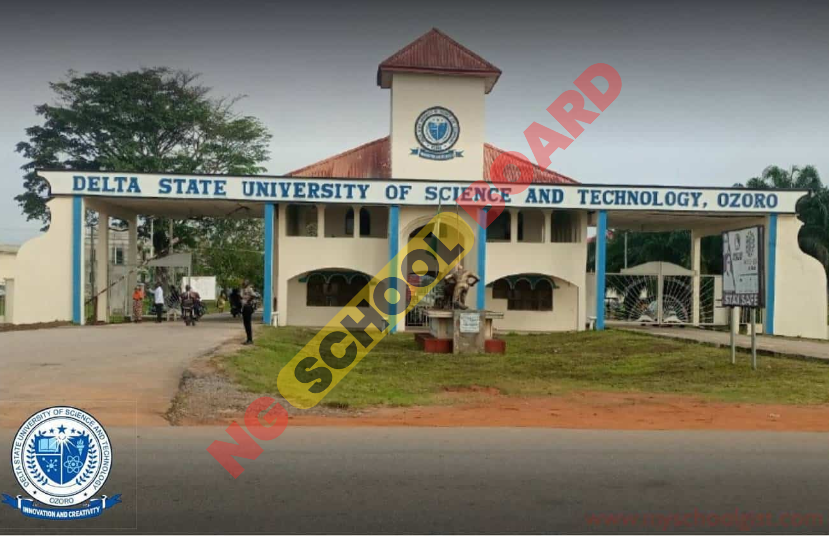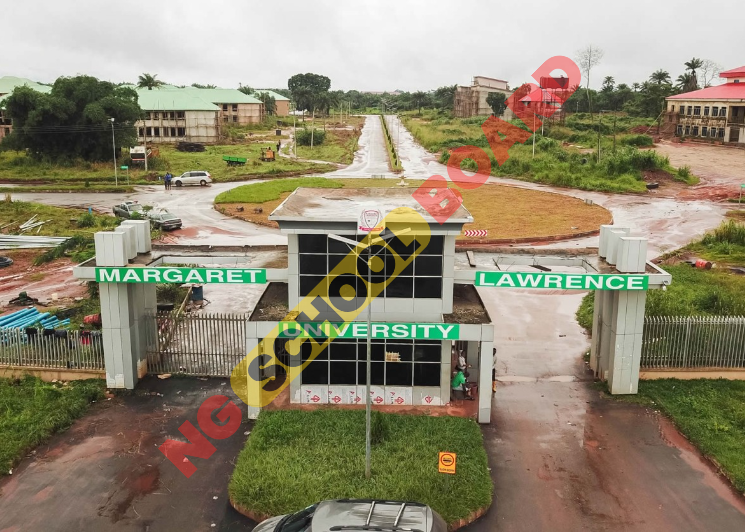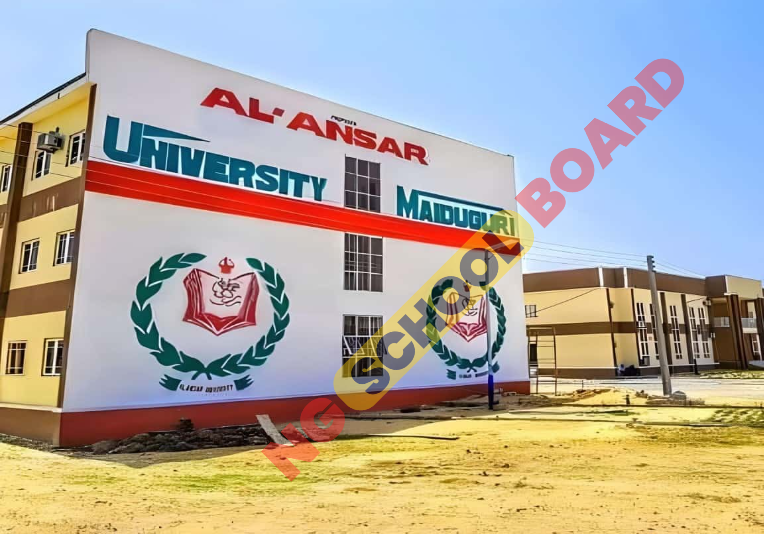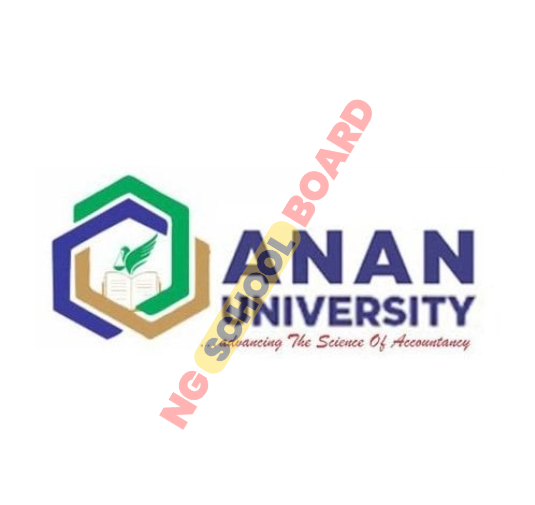An Overview of Courses at Delta State University of Science and Technology
Delta State University of Science and Technology (DELSUSTEC) is a leading university in Nigeria with its main campus located in Ozoro, Delta State. Founded in 2000, DELSUSTEC has quickly grown into a reputed institution offering a wide range of academic programs across seven faculties.

ALSO SEE:
University of Delta Courses Offered
How Food Can Be a Meaningful Gesture
15 Reasons Why Employers Love Foreign Graduates
The Impact Of Fast Food On Obesity Rates – Unveiling the Connection
Top 10 MBA Universities & Colleges In Canada
Delta University of Science and Technology Courses Offered
| Faculty | Courses Offered |
|---|---|
| Faculty of Agriculture | – Agricultural Economics and Farm Management |
| – Agricultural Extension and Rural Development | |
| – Animal Production and Health Services | |
| – Fisheries Technology | |
| – Food Science and Technology | |
| – Plant Science and Biotechnology | |
| – Soil Science | |
| Faculty of Science | – Animal and Environmental Biology |
| – Biochemistry | |
| – Biology | |
| – Chemistry | |
| – Geology | |
| – Marine Science | |
| – Mathematics and Statistics | |
| – Physics | |
| – Science Laboratory Technology | |
| Faculty of Engineering | – Agricultural Engineering |
| – Chemical Engineering | |
| – Civil and Water Resources Engineering | |
| – Computer Engineering | |
| – Gas and Oil Engineering | |
| – Marine Engineering | |
| – Mechanical Engineering | |
| – Petroleum Engineering | |
| Faculty of Environmental | – Architecture |
| Science | – Building Technology |
| – Environmental Management | |
| – Environmental Management and Toxicology | |
| – Estate Management | |
| – Quantity Surveying | |
| Faculty of Information | – Computer Science |
| Technology | – Cyber Security |
| – Information Systems and Technology | |
| – Journalism and Media Studies | |
| Faculty of Management | – Accounting |
| Technology | – Banking and Finance |
| – Business Administration | |
| – Entrepreneurship | |
| – Marketing | |
| – Public Administration | |
| School of Part-Time Studies | – Accountancy |
| – Banking & Finance | |
| – Business Administration | |
| – Marketing | |
| – Mass Communication | |
| – Office Technology & Management |
Some of the most popular courses at DELSUSTEC are highlighted below:
Faculty of Agriculture
With over 1500 students, the Faculty of Agriculture aims to drive food sufficiency, nutritional security and sustainable agriculture through its programs. Students gain practical skills in crop and animal farming, food processing, and agribusiness.
Agricultural Economics and Farm Management
This department focuses on applying economic principles to agricultural production, marketing, finance, and policy. Key courses cover farm management, agricultural marketing, agribusiness management, agricultural finance, and food policy. Graduates are equipped for roles in agribusiness firms, lending institutions, commodity trading, farm advisory services, and policy.
Agricultural Extension and Rural Development
Students learn skills to promote technology adoption, provide advisory services, and design community development initiatives among rural populations. Courses cover extension program development, community mobilization, adult education methods, rural sociology, and communication. Graduates work as extension agents, community outreach coordinators, and rural development officers.
Animal Production and Health Services
The program covers livestock nutrition, breeding, housing, disease prevention, meat/dairy processing, and biosecurity measures. Key courses are monogastric and ruminant nutrition, animal genetics, herd health, meat science, veterinary science, and livestock economics. Graduates are employed on cattle, poultry, and pig farms and allied industries.
Fisheries Technology
Students learn about sustainable aquaculture, post-harvest technology, quality analysis, hatchery operations, and fishing techniques. Courses cover fish biology, water quality management, aquaculture systems design, fish nutrition, fish processing, and fishing craft technology. Graduates find roles as aquaculture technicians, fish farm managers, fish inspectors, and lecturers.
Food Science and Technology
This program focuses on food processing, preservation, storage, quality analysis, product development, and safety. Key courses are food microbiology, food chemistry, food processing and packaging, sensory evaluation, food biotechnology, and food quality management. Graduates are hired by food processing companies, regulatory agencies, and research institutions.
Plant Science and Biotechnology
Students take courses in crop breeding, plant genetics, tissue culture, plant pathology, economic botany, and biotechnology techniques. The curriculum covers plant breeding, seed technology, plant biotechnology, weed science, plant virology, post-harvest physiology, and more. Graduates work as crop cultivators, plant breeders, nursery managers, horticulturists, and researchers.
Soil Science
This department focuses on soil chemistry, fertility, nutrient management, conservation, and land use planning. Courses include soil physics, soil microbiology, soil-water-plant relationships, land use planning, soil fertility management, and environmental soil science. Graduates find careers as soil scientists, environmental analysts, conservation specialists, and agriculture consultants.
Faculty of Science
The Faculty of Science has over 2500 students pursuing programs across nine departments. Students enjoy access to advanced labs and instrumentation facilities.
Animal and Environmental Biology
This program covers animal physiology, fisheries, parasitology, entomology, ecology, conservation biology, and environmental management. Key courses are general zoology, environmental chemistry, ecology, limnology, parasitology, fisheries biology, and more. Graduates pursue careers in fisheries, wildlife conservation, ecology research, and teaching.
Biochemistry
Students gain expertise in cellular mechanisms, enzyme kinetics, metabolism, clinical analysis, spectroscopy, and biochemical techniques. Courses include biomolecules, enzymology, clinical chemistry, separation methods, immunology, protein chemistry, and bioinformatics. Graduates work in healthcare, pharmaceuticals, food quality control, research, and teaching.
Biology
This broad-based program covers foundational biology disciplines like botany, zoology, physiology, genetics, cell biology, microbiology, and biotechnology. Students take courses in plant and animal sciences, biochemistry, ecology, evolution, and molecular biology. Graduates work as researchers, academics, science writers, clinical lab technicians, and teachers.
Chemistry
Students get rigorous lab training in inorganic, organic, physical, analytical, and industrial chemistry. The curriculum includes quantum mechanics, spectroscopy, electrochemistry, biochemistry, reaction mechanisms, and nanoscience. Graduates find roles in the chemical, food & beverage, petroleum, manufacturing, and healthcare industries.
Geology
This program focuses on mineralogy, petrology, paleontology, hydrogeology, engineering geology, geochemistry, and geophysics. Key courses are structural geology, sedimentology, stratigraphy, economic geology, petroleum geology, geochemistry, and geomorphology. Graduates work in mining, oil/gas, geotechnical services, natural hazard assessment, and earth science education.
Marine Science
Students learn about oceanography, marine biology, ecosystem dynamics, fisheries, aquaculture, and resource management. Courses cover physical oceanography, marine zoology, chemical oceanography, marine microbiology, fish biology, coastal management, and more. Graduates pursue marine research and education careers, or work in fisheries, conservation, and resource agencies.
Mathematics and Statistics
This department provides strong foundations in pure and applied mathematics, calculus, algebra, analysis, geometry, probability, and programming. Courses include real analysis, linear algebra, graph theory, mathematical statistics, stochastic processes, numerical analysis, and more. Graduates build careers in academia, finance, analytics, defense, and technology.
Physics
Students take courses covering classical mechanics, electromagnetism, optics, thermodynamics, electronics, quantum mechanics, nuclear physics, and astrophysics. The curriculum includes mathematical methods, electricity and magnetism, solid state physics, optics, nuclear physics, statistical mechanics and more. Graduates work in diverse technology industries, research, consulting, teaching, finance, and engineering.
Science Laboratory Technology
This program focuses on using modern lab instruments, quality assurance, calibration, quality control, documentation, and sample analysis. Students get extensive hands-on lab training across subjects like biochemistry, microbiology, hematology, histopathology, and chemical analysis. Graduates work as lab or field technicians, researchers, and testing professionals.
Faculty of Engineering
With over 2000 students, the Faculty of Engineering has wellequipped workshops and computing facilities across its eight departments. Students gain practical engineering competencies through industry linked projects.
Agricultural Engineering
Students learn about equipment design, food & bio-processing, irrigation systems, agric waste management, and renewable energy applications in agriculture. Key courses are farm machinery, food processing engineering, soil and water conservation, drainage engineering, agro-meteorology, and more. Graduates design agricultural solutions and work with various stakeholders along the farming value chain.
Chemical Engineering
This program focuses on chemical reaction engineering, process control, thermodynamics, fluid flow, heat transfer, mass transfer, plant design, and process safety. Students take courses in transport phenomena, chemical process principles, process modeling, petroleum refining, polymer engineering, and more. Graduates find employment in oil/gas, chemical, food, pharmaceutical, and consumer goods industries.
Civil and Water Resources Engineering
Students learn planning, design, and construction methods for buildings, roads, bridges, dams, water supply, irrigation, and drainage systems. Key courses are structural analysis, geotechnical engineering, highway and traffic engineering, hydraulics, hydrology, water/waste water treatment, and more. Graduates work in construction firms, public works departments, infrastructure consultancies, and real estate development.
Computer Engineering
This program focuses on hardware, software, operating systems, computer architecture, embedded systems, networking, algorithms, and programming fundamentals. Courses include digital logic, microprocessors, computer organization, VLSI design, data structures and algorithms, signals and systems, and more. Graduates build careers as computer engineers, systems analysts, network engineers, and programmers.
Gas and Oil Engineering
Students learn about analyzing geological data, drilling operations, production engineering, reservoir modeling, petroleum economics, and transport systems. Key courses are reservoir engineering, well testing, enhanced oil recovery, petroleum geology, natural gas processing, corrosion management, and more. Graduates work for oil/gas and allied services companies.
Marine Engineering
This program focuses on design, maintenance, and operations of marine vessels and structures. Students take courses on ship hydrodynamics, marine diesel engines, naval architecture, port and harbour engineering, offshore platforms, marine corrosion, maritime safety, and more. Graduates find roles in ship building, maritime transport, rig construction, port authorities, and consultancies.
Mechanical Engineering
Students gain expertise in machine design, thermofluids, control systems, manufacturing, and energy conversion. Key courses are thermodynamics, heat transfer, fluid mechanics, machine design, mechatronics, robotics, refrigeration, turbomachinery, and more. Graduates work in the automotive, aviation, oil/gas, manufacturing, and process industries.
Petroleum Engineering
This
program focuses on reservoir analysis, drilling operations, production engineering, project management, and transportation systems in the oil and gas industry. Key courses are reservoir simulation, drilling fluids, well logging, petroleum geology, petroleum economics, separation processes, pipeline design, and more. Graduates work for oil companies, services contractors, and specialized technology providers.
Faculty of Environmental Science
With over 1000 students, the Faculty of Environmental Science comprises six departments offering specialized environmental programs. Graduates help build sustainable communities through their roles in planning, development, and conservation.
Architecture
This 5-year program focuses on architectural design, site planning, building structures, construction technology, graphic communication, and professional practice. Courses cover architectural principles, building materials, structural analysis, environmental control, landscape design, architectural history, and more. Graduates work as architects, urban designers, architectural technologists, and lecturers.
Building Technology
Students learn planning, design, and construction principles for residential and commercial buildings. Key courses are construction materials, building services, quantity surveying, structural detailing, construction management, maintenance engineering, and more. Graduates find roles as building engineers, quantity surveyors, facilities managers, contractors, and consultants.
Environmental Management
This program covers environmental systems analysis, natural resource management, conservation biology, environmental education, impact assessment, remote sensing, and GIS. Courses include ecology, environmental chemistry, environmental legislation, waste management, environmental monitoring, climate change, and more. Graduates work as environmental analysts, sustainability coordinators, researchers, and environmental educators.
Environmental Management and Toxicology
Students take courses on environmental toxicants, pollution control, bioremediation, risk assessment, public health, occupational safety, and toxicology testing. Key courses are environmental toxicology, environmental epidemiology, water quality management, air pollution control, hazardous waste management, and more. Graduates monitor and control environmental hazards for regulatory agencies, industries, and consultancies.
Estate Management
This program focuses on real estate principles, property valuation, investment analysis, law, marketing, management, and development. Courses cover land economics, property management, valuation methodologies, mortgage financing, feasibility studies, agency practice, and more. Graduates work as estate surveyors, property managers, developers, real estate consultants, and lecturers.
Quantity Surveying
Students learn measurement, costing, contracts administration, budgeting, procurement, and regulation in the construction industry. Key courses are building economics, construction technology, measurement of works, contractual procedures, cost planning, construction law, and more. Graduates work for construction companies, consultancies, government agencies and real estate developers.
Faculty of Information Technology
With over 1000 students, the Faculty of Information Technology aims to produce IT professionals ready for the digital economy. Students get access to the latest software, tools and technologies across four departments.
Computer Science
This program focuses on software engineering, programming, algorithms, data structures, databases, operating systems, networks, and cloud computing. Key courses are object oriented analysis and design, database systems, algorithm design, computer networks, web technologies, and software project management. Graduates build careers as software developers, systems analysts, database administrators, and IT consultants.
Cyber Security
Students learn to assess digital risks, apply countermeasures, investigate threats, and enforce security policies. Courses cover ethical hacking, network security, cybercrime investigation, forensic analysis, cryptography, vulnerability assessment, and more. Graduates work as security analysts, forensic investigators, cyber police, penetration testers, and security consultants.
Information Systems and Technology
This broad-based program covers IT infrastructure, networking, business applications, data analytics, project management, and information security. Key courses are systems analysis and design, database design, web and cloud computing, data visualization, IT project management, enterprise architecture, and more. Graduates can work across roles such as systems administrator, business analyst, data analyst, and project manager.
Journalism and Media Studies
Students take courses in news writing, editing, graphics and layout design, photojournalism, broadcast media, public relations, advertising, and digital media. The curriculum covers media ethics, investigative reporting, multimedia journalism, strategic communication, and more. Graduates build careers in media houses, PR agencies, corporate communications, advertising, and digital media.
Faculty of Management Technology
With over 2000 students, the Faculty of Management Technology aims to nurture ethical business leaders. Programs offered focus on practical skills grounded in strong conceptual foundations.
Accounting
Students gain expertise in financial accounting, cost accounting, taxation, auditing, accounting systems, and financial reporting standards. Key courses are financial accounting, management accounting, income tax, accounting theory, auditing, forensic accounting, and more. Graduates work as accountants, financial analysts, auditors, CFOs, controllers, and finance consultants.
Banking and Finance
This program focuses on banking operations, investment analysis, financial markets, corporate finance, risk management, financial regulation, and fintech. Courses cover investment analysis, corporate finance, development finance, financial institutions and markets, portfolio theory, financial modeling, behavioral finance, and more. Graduates are employed in commercial banking, investment banking, insurance, fintech, and regulatory agencies.
Business Administration
Students take foundation courses in management, marketing, finance, strategy, accounting, economics, analytics, and operations. The curriculum includes organizational behavior, business communication, entrepreneurship, ethics, global business environment, and internships. Graduates gain multifunctional business acumen to work across roles in diverse industries.
Entrepreneurship
This program provides knowledge and skills for conceiving, launching, and scaling new ventures. Courses cover opportunity analysis, business planning, small business management, entrepreneurial finance, social entrepreneurship, managing growth, innovation management, and more. Graduates either startup their own companies or bring entrepreneurial thinking to established organizations.
Marketing
Students learn consumer analysis, communications, digital marketing, branding, pricing, distribution, and marketing analytics. Key courses are consumer behavior, services marketing, sales management, integrated marketing communications, digital marketing strategy, marketing research, and more. Graduates build marketing careers in consumer products, media, marketing agencies, and technology companies.
Public Administration
This program focuses on government processes, public policy, development management, local administration, human resources, public finance, and administrative law. Courses include public policy analysis, development economics, local government administration, public budgeting and financial management, administrative law, and more. Graduates work in public service, policy think tanks, international development organizations, and local government.
School of Part-Time Studies
The School of Part-Time Studies offers evening diploma and certificate programs tailored for working professionals to advance their skills.
Diploma Programs
DELSUSTEC offers 2-year part-time diploma programs in Accountancy, Banking & Finance, Business Administration, Marketing, Mass Communication, and Office Technology & Management. Classes are scheduled in evenings and weekends.
Certificate Programs
Short professional certificate programs are also offered in areas like computer applications, entrepreneurship, public relations, taxation, and supply chain management. These can be completed over 6 months to 1 year through evening or weekend classes.
Frequently Asked Questions
What are the admission requirements for undergraduate programs at DELSUSTEC?
The minimum entry requirement for bachelor’s degrees is 5 credits including English, Mathematics and 2 other subjects in WAEC/NECO. Some programs also require credit passes in specified subjects relevant to the course.
Does DELSUSTEC offer online or distance learning programs?
As of now, DELSUSTEC does not offer full online degree programs. However, it has some online diploma and certificate courses, and plans to expand online program offerings in the future.
What accommodation options are available for students?
DELSUSTEC has student hostels on campus that can accommodate about 30% of full-time students. Others find housing near campus through private arrangements.
What scholarships are available for international students?
DELSUSTEC provides some scholarships for international students from Africa and parts of Asia. Scholarships are awarded based on merit to cover a portion of tuition fees.
Does the university have exchange programs or partnerships with foreign universities?
Yes, DELSUSTEC has exchange partnerships, joint research collaborations and faculty exchanges with universities from countries like UK, Malaysia, Germany, USA and South Africa.
What facilities are available on campus?
The university has lecture halls, well equipped labs, computer labs, library, health center, sports complex, cafeteria, bookshop, banking facilities and wifi access across campus.
What is the university’s grading system? Grades are awarded on a 5-point scale from A (80-100%) to F (0-39%). Other grades given are P (pass) and W (withdrawn). GPA is calculated to determine academic standing.
What student clubs and activities are available on campus? There are diverse student clubs related to academics, culture, sports, social service and hobby interests. The university also hosts events like cultural exhibitions, conferences, sports meets and annual carnivals.
Does the university provide job placement support? Yes, the DELSUSTEC Career Development Centre offers guidance on internships and job opportunities. It also conducts job interview training and hosts an annual graduate recruitment fair.
For the most up-to-date information, I recommend visiting the Delta State University of Science and Technology website: https://dsust.edu.ng/

Hello, I’m Emeka by name, an article writer with a passion for words and storytelling. I have a knack for crafting engaging and informative content that captivates readers and delivers valuable insights. Whether it’s exploring the latest trends, sharing knowledge, or diving into creative narratives, I’m here to bring words to life. Join me on a journey through the world of ideas and stories as we explore the power of written expression.





